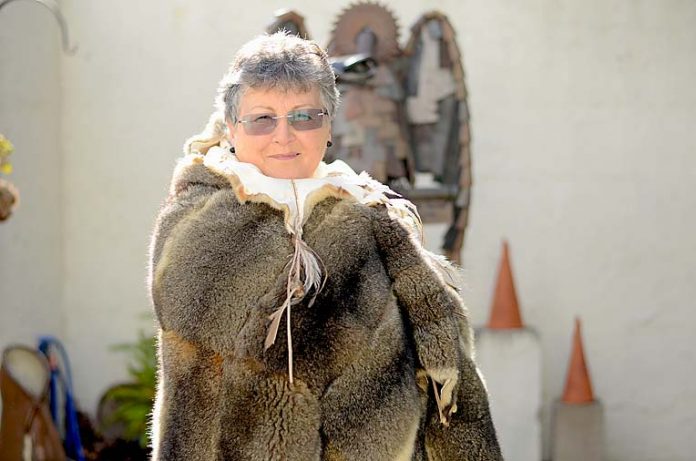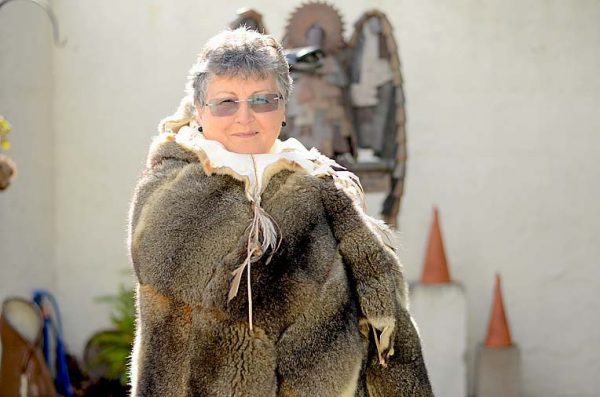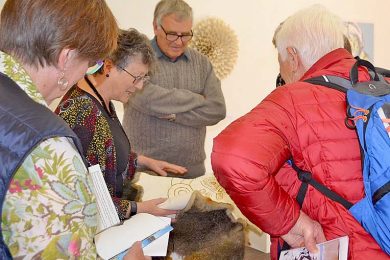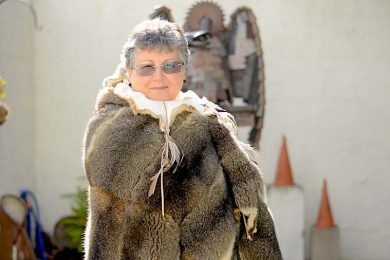

BOANDIK history has been preserved in a unique manner with Boandik Elder Aunty Michelle Jacquelin-Furr’s possum skin cloak having her great-grandmother’s story burnt on the inside skin.
Aunty Michelle’s great-grandmother Annie Brice is a historical figure for the Penola Coonawarra region, having been taught by Saint Mary MacKillop herself.
Saint Mary was the 24-year-old daughter of Highland immigrants, who moved on to become governess to her Cameron cousins at Old Penola Station.
The relationship between Saint Mary and Annie is one that has recently been expressed with details emerging through Aunty Michelle’s children’s book Annie’s Story – Growing Up Strong on Boandik Country.
Annie’s mother was a Boandik-born woman, while her farther was ex-convict William Brice who worked as a labourer at the Penola Station.
Growing up mostly under the supervision of Saint Mary’s aunt Margaret Cameron, Annie became of interest to Saint Mary where at age 11, Annie took lessons with Mary who taught her religion, reading and writing within the school room.
“It was uncommon for Aboriginal children to learn how to read and write,” Aunty Michelle said.
“At that time Mrs Cameron looked after and fed all the Aboriginal children near the station, including Annie.
“Saint Mary called Annie into the school room one day, inviting her to come and learn with the other children and being an Aboriginal girl in the 1800’s who could read and write was something that gave Annie a lot of power.”
Alongside teaching young Annie, Saint Mary was also known to comb the lice out of her hair and tend to her sores, as well as encourage Annie to sing.
“Back then Aboriginal people were not allowed to speak or sing in their native language but apparently Annie had a beautiful voice,” Aunty Michelle said.
Baptised on July 1, 1856 with her sponsors Margaret Cameron and Father Michael Ryan, Annie was also mentioned in Saint Mary’s letters regarding her eagerness to learn, read and write.
She was also mentioned in diaries kept by Sisters Agnes Smith and Teresa MacDonald in the late 1860s.
Annie’s knowledge on reading and writing gave her an advantage later in life, as she represented herself numerous times within the court.
“When Annie was confronted with issues she could actually make a case in court and sign her name,” Aunty Michelle said.
Annie came to represent herself in court during an action before the local stipendiary magistrate and a jury against Penola town clerk Thomas Arauf.
“He would not pay her, so Annie apparently put on her boots, jumped the fence and kicked holes in all his pumpkins he was going to sell,” Aunty Michelle said.
“In court she stood up and put her case forward but despite not winning, she was able to present a solid case to the magistrate.”
Annie’s first child, Joseph was born the same year with the father being police trooper Winfred Pollitt, keeper of the Penola Gaol and who denied paternity following Annie’s stay there.
Working as a domestic servant at the Royal Oak Hotel, Annie unsuccessfully sued the barman in 1871 for maintenance of her second child Walter before moving to Mount Gambier in 1875.
During her time in Mount Gambier, Annie successfully prosecuted a man for using threatening language against her while working as a domestic servant for Doctor Wehl and others.
Living to the age of 82 , having two husbands and 13 children, Aunty Michelle said she was proud to be a descendant of such a strong Aboriginal woman.
“I consider her a leader of her people,” Aunty Michelle said.
“Quite a lot has changed since then and we have some strong Boandik leaders emerging.
“I am proud of being related to one of the apical ancestors of Boandik country, Annie Brice, because without her, her descendants would not be here.
“When I do Welcome to Country’in language I am really saying – dudu Annie (thank you).”
Aunty Michelle now takes her children’s book to schools around the region, using it as a base to speak about her story and what it was like for Aboriginal women and children living and growing up in the 1800s.









